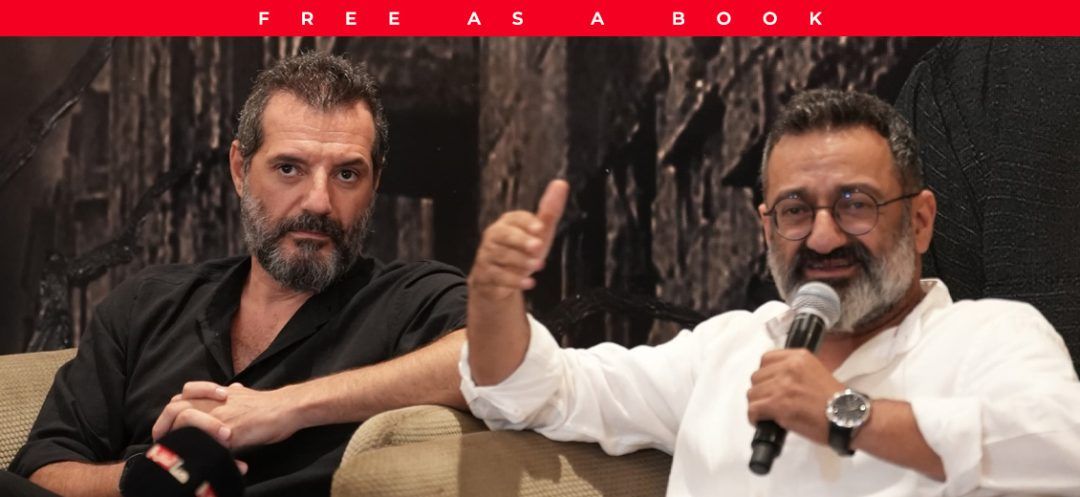
From August 1 to 31, Adel Karam and Georges Khabbaz will bring the stage of Casino du Liban to life in the play written by Georges Khabbaz and produced by Tarek Karam, Khiyal Sahra (“Puppet”). On this occasion, a press conference was held at La Martingale, attended by a multitude of journalists representing various Lebanese media outlets.
After a presentation by press officer Rana Astih, speeches were given by the CEO of Casino du Liban, Roland Khoury, the play’s producer Tarek Karam, the play’s author and director Georges Khabbaz, and actor Adel Karam, whose address concluded the event on a convivial note. The warm and hospitable welcome from the producer and actors matched their guarded responses about the play’s content and plot, aimed at piquing the audience’s curiosity. This is especially true given that the play is marked by the unusual, with an unexpected ending that will prompt the audience to reconsider the events from a new perspective.
 Adel Karam and Georges Khabbaz
Adel Karam and Georges KhabbazFor Tarek Karam, Khiyal Sahra is not just a play but a reminder of the Lebanon we love. The choice of Casino du Liban’s theater is also significant, as it has hosted the grandest dramatic and musical performances. Moreover, the Casino's management has awarded trophies to the two actors, Adel Karam and Georges Khabbaz, thus honoring their remarkable careers.
 Tarek Karam Roland Khoury Georges Khabbaz and Adel Karam.
Tarek Karam Roland Khoury Georges Khabbaz and Adel Karam.Translating the title Khiyal Sahra to French, one wonders if it refers to a puppet state, reflecting the Lebanese people who struggle to impose their will, or a puppet government, a true marionette in the hands of an armed militia. The mystery remains. Tarek Karam promises many surprises in the play, including a bombshell ending. He praised the Casino's management for respecting his and the author's wish to keep ticket prices accessible (between $20 and $100), Georges Khabbaz for creating a masterpiece, the journalists for attending, especially the veterans, and his “blood brother” Adel Karam, the phenomenon.

Georges Khabbaz began his speech with self-deprecating humor about his height: “Whether I stand or sit, it’s almost the same.” When asked if the play, featuring two somewhat weird characters side by side, is inspired by absurdist theater like Beckett and Ionesco, he replied: “The play is probably inspired by my readings of Shakespeare, Beckett, Ionesco, Chekhov, Molière, and even Labiche. Similarly, I also acknowledge the influence of Arab playwrights.”

Khabbaz started writing this project in 2020, during the coronavirus pandemic. Isolated after the health disaster, financial bankruptcy, and the near-nuclear explosion that devastated the capital, he was alone with his pen and blank pages, thinking neither of himself nor of Adel Karam. An idea crossed his mind: two entirely different people meet in a specific place and time and become friends despite the vast socio-cultural and religious divide between them. When he mentioned his project to Tarek Karam, Tarek suggested involving Adel Karam, which filled Khabbaz with joy. Though Adel has made a significant mark on television and cinema, Khabbaz believes that in theater, he can go much further and reveal the many facets of his dramatic talent.

Khabbaz rewrote Khiyal Sahra to perfectly suit the dynamic duo he forms with Adel Karam. According to him, people appreciate theatrical works that respect their intelligence and critical sense without intimidating them with overly sophisticated styles or looking down on them with arrogance. In Lebanon, there are generally two types of theater: commercial theater built on crudeness and obscenity, and elitist theater that intimidates even the most zealous. Theater that reflects real life is rare. Khabbaz notes that what they will present in this play is the result of the heavy experiences of the past three years, equivalent to thirty years of experiences and maturity. Khiyal Sahra straddles all theatrical genres, using all registers wisely. There is even a form of archiving displayed on various screens serving as the backdrop, showcasing Lebanon’s history from the 1970s to the 1980s, with a jump to the present. Khabbaz emphasizes that modern Lebanese history has yet to be written, and the media, owned by warlords, have narrated events as they see fit, pushing their followers to adopt their version of events.
 Adel Karam and Georges Khabbaz received trophies awarded by the management of Casino du Liban.
Adel Karam and Georges Khabbaz received trophies awarded by the management of Casino du Liban.One of the highlights of the event was Adel Karam’s speech. He declared that he was immediately captivated by the story when Georges Khabbaz told him about it, convinced that it was the role he had long wanted to play on stage. It is a dream come true for him, especially since he is proud to work with Georges Khabbaz, a versatile artist who even composed the musical pieces for the play. When asked about his ability to make the audience laugh or cry, Adel Karam replied that he loves playing all genres and finds himself perfectly suited to both comedy and drama. For him, a good actor should be able to take on all roles assigned to him. Although people often associate him with comedy due to his acting career focused on sketches in theater and television, his best role, the one in which he fully identified, remains his role in the film The Insult (nominated for an Oscar). He particularly appreciated the people he worked with, the working atmosphere, and the encounters he made. This role marked him and his professional career. Time will tell if his role in Khiyal Sahra will also mark the theatrical career of one of Lebanon’s most popular artists.
 Tarek Karam presenting a trophy to the CEO of Casino du Liban Roland Khoury in recognition of his cultural contributions.
Tarek Karam presenting a trophy to the CEO of Casino du Liban Roland Khoury in recognition of his cultural contributions.
Read more



Comments